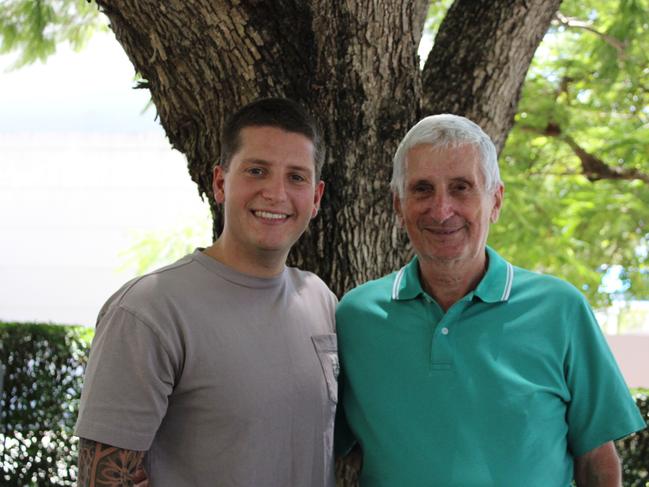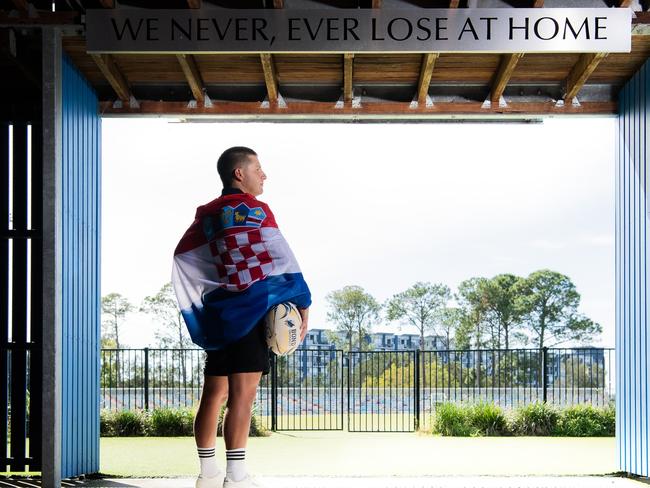Grandfather’s midnight escape from Italy in World War II leads to Jordan Lenac’s international rugby debut for Croatia
Bombs were routinely being dropped around Tony Lenac’s house when he was forced to flee Italy in the dead of the night at the age of 4 to escape World War II. Now his long awaited return has opened the door for his grandson to make his international rugby test debut. See the video.
Sport
Don't miss out on the headlines from Sport. Followed categories will be added to My News.
Tony Lenac was four-years-old when he fled his Italian home in the dead of the night with his family to escape the dangers of World War II.
It sparked a six-year journey that ultimately led him to Australia and now, almost 80-years later, has resulted in his Gold Coast-based grandson Jordan Lenac preparing to make his international rugby test debut for Croatia on Saturday, March 16, against Lithuania.
The 26-year-old departed on Wednesday to play two games for Croatia in the 2024 Rugby Europe Trophy.

Tony, 83, and his family were forced to flee his then Italian home town with nothing more than just the clothes on their backs.
Alongside his two siblings and parents they left everything behind in Fiume, a town that became part of Croatia during the war and is now known as Rijeka, crossing the boarder into Yugoslavia.
Tony said he will always remember the night they everything changed.
“My little brother and my little sister pretended we were going to the beach for the whole day,” Tony said.
“Back then you couldn’t take luggage with you because you would get arrested.
“So we couldn’t take any documents, any spare clothing, any food because if you’re only going out for the day they ask you ‘why are you taking all of this?’
“So we pretended we were going to the beach and walked on foot all day through the northern parts of Yugoslavia, Fiume to try and cross the border.
“I remember trying to cross the border at night time, we could hear dogs barking and I remember crossing it in the middle of the night.
“From there we got transport and ended up in Trieste, the refugee camp while awaiting to get approval for deportation.”
Tony can still remember how bad things were during the war despite being so young during the worst of the war.
“We would hear the air raid sirens going off all the time, you know, with planes flying over,” Tony said.
“We would have to get down to the bunker while bombs were being dropped.
“It was so scary, you know, it’s something that I will never forget.”
After fleeing Trieste, Tony’s family caught a train to Bremen in Germany and then went up to Bremerhaven where his family caught a ship bound for Australia.
From the night he left his home to the day he caught the ship, it had been six very long years for the family.
Almost 70-years later, Jordan had headed to play rugby in Glasgow and looked to get an Italian passport and represent his heritage.
But Tony had no proof of where he lived, leaving Jordan unable to get an Italian passport.
According to the Italian embassy, many documents remain unknown due to being lost or damaged during World War II.
Determined to help his grandson, Tony, his son and Jordan set out from the town centre of Rijeka to find his house.
Jordan said it has been a very long process to get to this day.
“The whole process for us trying to get passports was really hard, we tried the Italian’s first because that is what we identify as,” Jordan said.
“Went through all that with the consulate in Australia and that all got sent off.
“Then about a year into that process they knocked us back.
“(They) said more or less that Fiume is now Croatia so that was kind of a big red flag and the second (reason) was because granddad’s family got forced out they saw that as sort of betrayal.”
The family then reached out to the Croatian government and went down the pathway of trying to take the next step in the process.
“After talking to the consulate in Sydney and our immigration lawyer at they time,” Jordan said.

“They said because of how much was lost, if we could prove that we were in Fiume during that war period and had to be displaced.
“They were welcoming back citizens to try and rebuild their population and the local economy.
“It was a bit of a mix bag going through that process, took a couple of years but in the end it kind of all worked out.
“Strange thing to think about with granddad we always thought we were Italian and we kind of still do but to then turn around and be like well actually no you’re not.”
Jordan was born and raised here in Queensland, attending The Southport School as he chased a sporting career.
The now 26-year-old admitted he was never the most academic person and found sport as his biggest outlet.
“I went to Somerset College when we first moved down here from Brisbane, which wasn’t really a good fit for me,” Jordan said.
“Being a really hyperactive, sporty kid going to such an academic school, I really struggled to find that balance.
“Then when I was 14, I made first Queensland rep teams and a few schools from the state started offering positions to go to.
“A few in Brisbane, a couple in Toowoomba and then TSS jumped in late and I already had a good relationship with coaches from TSS through rep programs.”
Spending his senior years playing at TSS, Jordan went over to Glasgow at the end of 2020 to take on rugby union on the bigger stage.
“Did two years in Glasgow and then seven months in Portugal kind of on the way home,” Jordan said.
“It was a pretty good experience, for rugby especially because I was one semester away from finishing my degree.
“I was kind of in a bit of a rut, didn’t know what was going on and that sort of quarter-life crisis is the best way to put it.”
The now international player came back to Australia to finish off his undergrad in exercise physiology and received the 2024 John Eales Rugby Excellence Scholarship.
But it was how he took the very next step to get onto the international stage that took even him by surprise.
“It was really strange, a good mate of mine Dylan Rowe who plays for Sunnybank in the same comp we play in, he played for Croatia a couple of years ago,” Jordan said.
“We have always had the banter between us because he knew I was Italian and you know we don’t really like each other.
“But someone told him that I had a Croatian passport through this whole process.
“He reached out to the head coach and explained my situation and then within a day or two he kind of hit me up and told me the dates and said they would love to have me play.”
With the family growing up identifying as Italian’s it was a tough conversation between Jordan and his grandfather when he told him he was playing for Croatia.
“The first kind of chat going to play for Croatia wasn’t that well received,” Jordan said.
Tony said he remembers when they went back to find the house running into one of the locals.
“I spoke to this gentleman, would have been about my age and I asked him how do we get to town centre,” Tony said.
“And I asked him in Italian which he responded in Italian as well.
“But what he said was there is canal in the middle, one side Italy the other side Yugoslavia which is now Croatia.
“But he said it so stern as if to say we don’t like Croatian’s.”
Jordan will represent Croatia against Lithuania on Saturday March 16 before taking on Switzerland on Saturday March 23.




